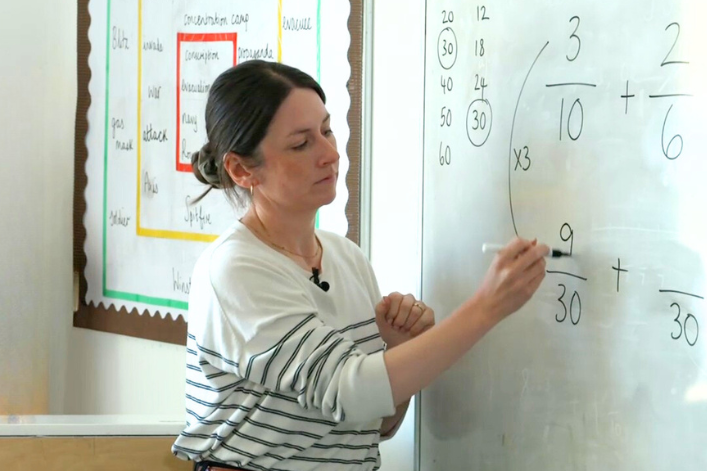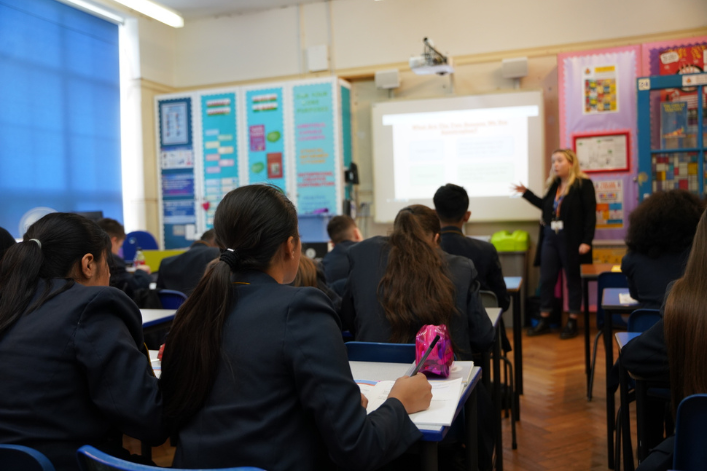
A group of leaders from across education in Wales came together at the Urdd Eisteddfod at Margam Park this week to discuss the brand-new range of qualifications for 14 to 16-year-olds launching from September.
Qualifications Wales, the qualifications regulator, and Estyn, the education and training inspectorate, held a joint panel discussion about the new National Qualifications on the Eisteddfod Maes on Tuesday 27 May.
Hosted by Ashok Ahir, Qualifications Wales’ Director of Communications and Engagement, the panel included Qualifications Wales’ Chair David Jones, Estyn Chief Inspector Owen Evans and Matthew McAvoy, Ysgol Gyfun Cwm Rhymni Assistant Head and CYDAG’s Secondary Leader.
Starting from this September, Year 10 learners will be able to choose from a broad range of new qualifications designed to support the purposes of the Curriculum for Wales, and to provide skills that are in demand by employers. Subjects coming this year include new combined language and literature GCSEs in Cymraeg and English, Mathematics and Numeracy, Business, Computer Science and Food and Nutrition. More new GCSE qualifications will follow from next year, and from 2027, for the first time schools will also be able to offer new work-related VCSEs in subjects such as Public Services and Engineering – broadening what is available to learners across Wales.
Topics discussed by the panel included how the new qualifications align with the Curriculum for Wales, the different qualifications that will be launched in each of the three implementation waves from 2025 to 2027, and the crucial role that schools will play in developing their provision.
David Jones, Chair of Qualifications Wales, said:
“I always enjoy meeting lots of learners, parents and teachers at the Eisteddfod but especially so this year as it’s my final year as Chair. I’m very happy that I will get to see the first wave of these brand-new qualifications be rolled out to 14 to 16-year-olds before my tenure ends. Developing these new qualifications has been a long and very detailed process, involving so many stakeholders – including learners, teachers and school leaders of course. Those learners are now going to benefit from increased opportunities for hands-on learning, a greater mix of assessment methods, and the opportunity to build knowledge and skills in a really diverse range of subjects. Many thanks to those who took part in the panel.”
Owen Evans, His Majesty’s Chief Inspector of Education and Training at Estyn, said:
“It’s great to be at the Urdd this week and in particular to be involved in discussing the future landscape of qualifications in Wales at the session hosted by Qualifications Wales. It was great to hear the perspectives of a school leader in relation to this. Curriculum and high-quality teaching are always a focus for us on inspection and we wish schools well with their work to implement the new qualifications.”
Matthew McAvoy of Ysgol Gyfun Cwm Rhymni and CYDAG, said:
“I was very pleased to be invited to take part in this panel. There is of course a huge amount to prepare ahead of first teaching in September – as there always is ahead of any significant change – and the partnership working and collaboration that already exists between schools across Wales will play an important role going forward. Speaking from my own school’s perspective, we’re really excited that we’re going to be able to broaden our offer to our learners so that they end up with qualifications that really reflect how we live and work now – putting them in good stead for the pathway they choose after they leave us.”
For full details of the new National Qualifications, including which subjects will be introduced when, see National 14-16 Qualifications | Qualifications Wales.
To learn more about Estyn’s work, see www.estyn.gov.wales.
To learn more about CYDAG, see www.CYDAG.cymru









